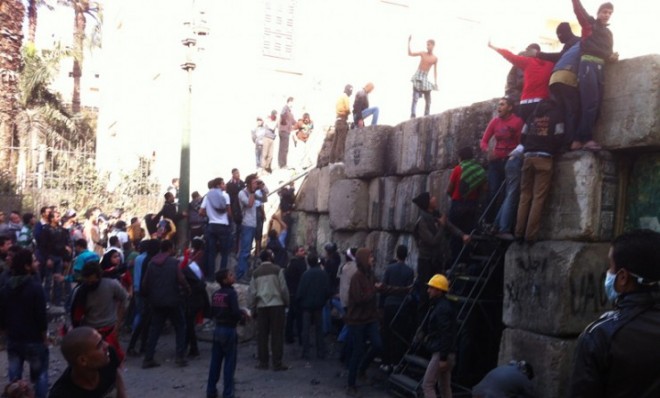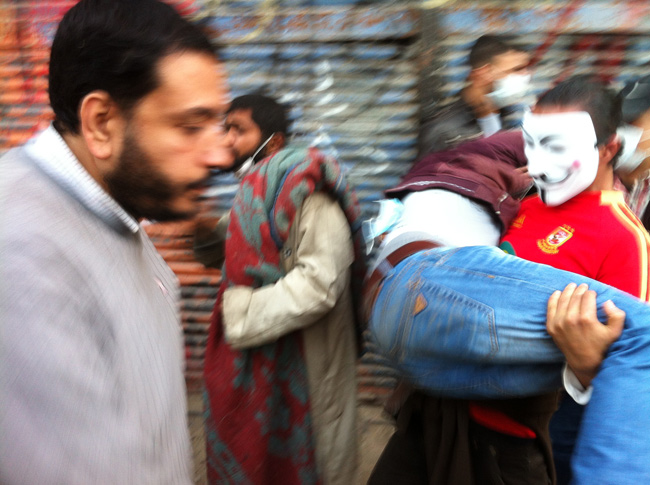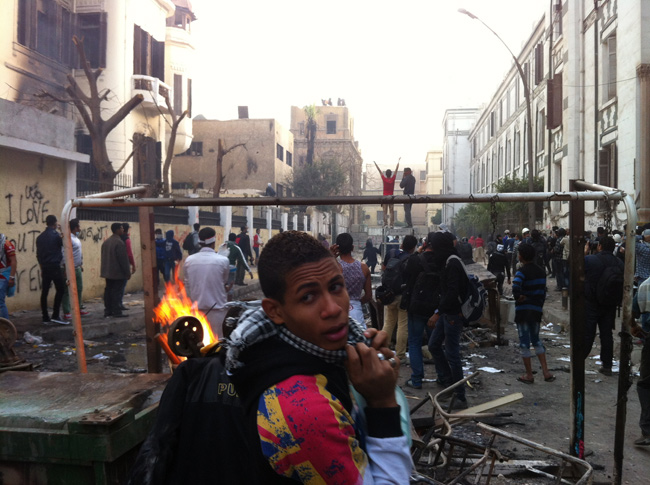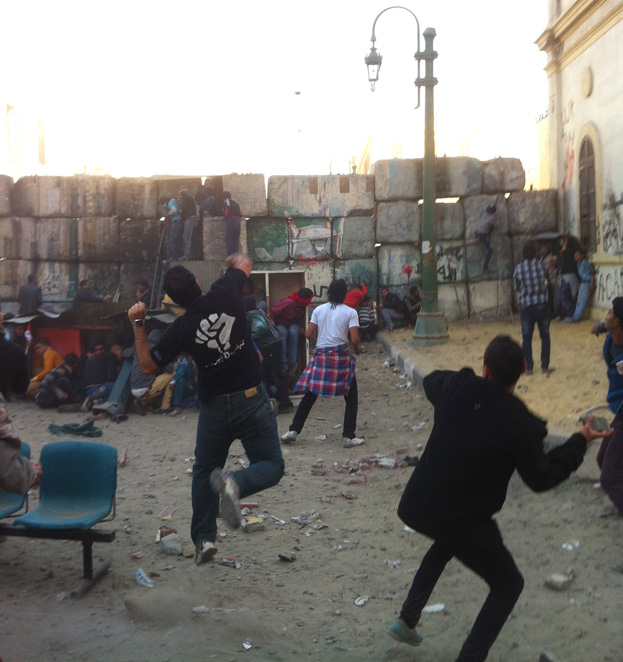Dispatch from Cairo: Egypt on the brink
As violence spreads across the country, the government faces grim choices

A free daily email with the biggest news stories of the day – and the best features from TheWeek.com
You are now subscribed
Your newsletter sign-up was successful
CAIRO, EGYPT — While the situation in Egypt since the 2011 revolution has been consistently chaotic, the last week was calamitous even by Egyptian standards.
Urban centers near the Suez Canal, a vital international waterway, were engulfed in what appears to be a full-scale insurrection against state authority. Deadly street battles between the police and protesters flared up in downtown Cairo. And once again the country's fledgling democracy is teetering on the brink.
The Islamist government has already alienated liberals, secularists, and minority religious groups, and is now increasingly being blamed by its base and the center for continuing lawlessness.
The Week
Escape your echo chamber. Get the facts behind the news, plus analysis from multiple perspectives.

Sign up for The Week's Free Newsletters
From our morning news briefing to a weekly Good News Newsletter, get the best of The Week delivered directly to your inbox.
From our morning news briefing to a weekly Good News Newsletter, get the best of The Week delivered directly to your inbox.
With political dialogue elusive and violence escalating, the government of President Mohamed Morsi faces the choice of reinstating the brutal, authoritarian measures of the Mubarak era, or letting the country slide further into chaos.
In Cairo, violent street fights are tearing apart the downtown area, the capital's economic and cultural nerve center. Secular activists, football hooligans, and grubby street children fight police on the Nile Corniche, an open promenade that runs along the famous river. Meanwhile, gangs of thugs prey on peaceful activists, local businesses, and passers-by in the city's shadowed side streets.

Women are being viciously targeted. Over the last week, there have been more than a dozen brazen gang rapes and sexual assaults in and around Tahrir Square. In one particularly harrowing case, a gang of youths took turns raping a 19-year-old woman, mutilated her vagina with a knife, and left her naked on the street. She is reportedly still in critical condition in a Cairo hospital, suffering from internal injuries.
I personally witnessed one of these assaults in Tahrir. Some tried to help the woman, while others joined in the assault. There were masses of people pushing past each other to get away, and I, along with everyone around me, was pressed against a wall, unable to help, flee, or move.
A free daily email with the biggest news stories of the day – and the best features from TheWeek.com
Supporters of the Islamists allege that the people raping, robbing, and looting are drug-addled thugs, hired by the secularists as muscle who have since gotten out of control. For their part, the secularists accuse the Islamists, the police, or some combination of the two of hiring the rapists in order to keep people away from Tahrir. It's also certainly possible that the assailants are simply unaffiliated criminals taking advantage of the chaos to do whatever they want.
While the capital is in bad shape, the situation is even worse in Port Said, which is located 200 km from Cairo, on the banks of the Suez Canal. The violence there was sparked when a group of local soccer hooligans (known here as Ultras) were sentenced to death for killing more than 70 Cairo-based soccer fans in a riot last year.
The trial was eagerly anticipated here in Egypt. The Port Said Ultras were demanding an acquittal, while the Cairo Ultras were promising massive reprisals if the defendants received anything less than the death penalty.
Shortly after the sentence was announced, families and friends of the condemned armed themselves with guns, knives, and bombs, and attempted to storm the local prison. The city itself became engulfed in street fighting, which soon dwarfed the deadly violence in Cairo.

Both protesters and police began using live ammunition. Roads and railroads were blocked, and the few journalists who were able to make it into the city were attacked. After two policemen were killed, the police retreated to fortified stations, shooting live ammunition into crowds and killing dozens of people. There have also been reports of unidentified snipers randomly firing on police and civilians.
On Sunday, security forces attacked a funeral march held for victims who had been killed the previous day, injuring hundreds more and further inflaming the situation. The uprising has spread across the Suez region, and while the army has been deployed to these areas, it is not challenging the protesters or enforcing the curfew.
The secularist opposition is predictably portraying the violence across the country as a principled, popular revolution against Morsi and his Islamist ideology. There may be a shred of truth to this, but the multiple protests and riots also have roots in deeper grievances that could spell trouble for any other group that comes to power.
Decades of dictatorship, state-sanctioned brutality, and economic desperation have left a majority of young Egyptians feeling like they have no stake in Egyptian society. They bear deep resentment toward the political class and state authority. Government here is generally seen as inherently corrupt, and the police are almost universally despised. The massive underclass has very little realistic chance of social mobility, and the shrinking middle class is fighting for a piece of an ever-smaller pie.

Mubarak's overthrow did not change that. Morsi's cohort has failed to reform the corrupt judiciary and security forces, two institutions that are doing everything in their power to preserve their privileges. And despite what secular politicians say, these are not problems that will change the minute they get into power. The people of Egypt seem to know this, and while the Islamists are undoubtedly losing popularity, the secularists are not gaining support. People are simply withdrawing from the political process.
Egypt's economic problems don’t have easy solutions either. In exchange for a loan, the Islamists have thrown their lot with IMF-backed austerity measures, which will undoubtedly bring massive hardship to Egypt’s poor, at least in the short term. The secularists, for their part, either back the austerity plans, or advocate doubling down on the the bankrupt, inefficient state economy.
The protesters' anger about political intransigence and economic stagnation is understandable. But, of course, the protests have also made things much worse. Egypt's vital tourism industry has been enervated, while Morsi's weakness has strengthened the position of the military and the courts.
The country is being torn apart. The best solution is a political agreement, or at least a detente, between the country's various factions. But political solutions require time, patience, and unity, all of which, sadly, are in short supply.
Jake Lippincott earned a degree in Middle Eastern Studies at Hampshire College. He worked in Tunis during the popular uprising there, and is now based in Cairo.
Jake Lippincott earned a degree in Middle Eastern Studies at Hampshire College. He worked in Tunis during the popular uprising there, and is now based in Cairo.
-
 Why is the Trump administration talking about ‘Western civilization’?
Why is the Trump administration talking about ‘Western civilization’?Talking Points Rubio says Europe, US bonded by religion and ancestry
-
 Quentin Deranque: a student’s death energizes the French far right
Quentin Deranque: a student’s death energizes the French far rightIN THE SPOTLIGHT Reactions to the violent killing of an ultraconservative activist offer a glimpse at the culture wars roiling France ahead of next year’s elections
-
 Secured vs. unsecured loans: how do they differ and which is better?
Secured vs. unsecured loans: how do they differ and which is better?the explainer They are distinguished by the level of risk and the inclusion of collateral